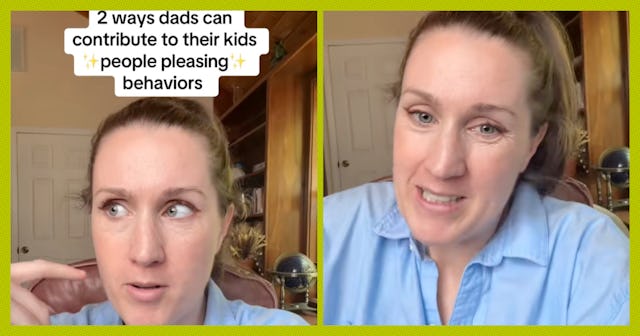Did You Know Dads Can Accidentally Promote People-Pleasing Behavior In Their Kids?
Here's how it happens and how to stop it.

A licensed family and marriage therapist, Kate Gray, wants to help dads do a little better because they might be (unintentionally) making their kids into people-pleasers. In her now-viral TikTok video, Gray shares how dads might accidentally instill certain pleasing behaviors in their kids and how to stop that in its tracks.
In her video, Gray points out two major ways that dads accidentally promote people-pleasing behaviors in their kids.
“There are two ways that dads can accidentally promote people pleasing in their kids. I'm going to tell you the behavior, the intention, and the impact of the behavior, and then what to do instead,” she beings.
“The first thing is that they say to the kids: ‘We need to be so grateful for all mom does for us.’”
Gray says that this phrase is not inherently wrong or “bad.” She gets that dads are trying to reach their kids to be grateful and show appreciation for their mom.
“The issue is that they're doing it to the kids about the other parent, and the impact of that is that it can create guilt in the kid. If the kid wants more, they may feel guilty because we need to be grateful for everything we have. If what mom is doing isn't good enough for me, if she's doing something that I don't like, I am as a kid, am I allowed to be upset?”
She says that by demanding gratefulness and thankfulness for “everything mom does” might create shame in a child who might not always be pleased with mom. Gray says that a much better way to get this message across is for dad to model the behavior he wants to see.
“It's just to model it with the wife, with the mom. ‘Sweetheart, you do so much for us. I love you so much.’ And give her a hug and connect, separate from the kids. That's just modeling it. That's all you have to do,” she says.
Secondly, Gray notes that if a husband’s partner is a stay-at-home parent, when they leave the house to go to work, they might instruct their kids to “be good for mom.”
Again, inherently good, the intention is there, but this kind of rhetoric, again, can create shame and guilt in kids. She also notes that this kind of instruction could be a partner’s own guilt creeping in.
“Maybe, all last night, you were sitting there, listening to her, saying how hard of a time she was having. You feel guilty about all that she's doing for you. Maybe you feel like, Oh my gosh, I'm just bringing home money. Like that's not enough. She's doing so much. And so you feel guilty. And so you kind of project that on your kids,” she says.
“Intention's good, but the impact of that is that the kids might feel guilty about and they might feel responsible for mom's emotions. And that is not the case. Even if she's a stay-at-home parent, she is responsible for her emotions, and she should call you to deal with them. And it should not have anything to do with the kids.”
Instead of instructions to “be good,” Gray suggests that dad tells the kids directly, “Y'all are going to have so much fun with mom today. You're allowed to be upset, express all of your emotions. Mom can handle it, and we're so proud of you.”
“And again, just model the appreciation with your wife in front of them. The last thing to do is with yourself. Notice your guilt. Are you coming from a place of guilt? Or are you coming from a genuine place of appreciation? Maybe it's both. But be curious about the guilt. How often does this show up? What else is there? What to it? Like, where does this come from? Most likely, it came from your own family dynamics. Parenting your kids is re-parenting yourself. Keep it up. You're doing great.”
After her video gained traction, TikTok users chimed in with their own thoughts.
Another user said, “Dad often say this because they’re not showing the correct amount of gratitude also so now I feel burdened with her whole emotional care”
“Seems like the theme here is that correct parenting happens through actions and modeling behavior, not through spoken communication? I’m not a parent yet but I’ve been trying to absorb proactively,” one user wrote.
The OP replied, “Yes- kids do what you do, not what you say.”